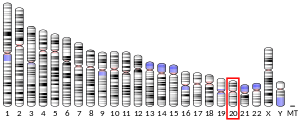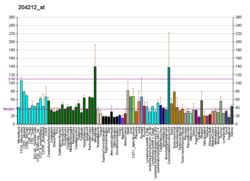ACOT8
Acyl-coenzyme A thioesterase 8 is an enzyme that in humans is encoded by the ACOT8 gene.[5][6][7][8][9]
The protein encoded by this gene is a peroxisomal thioesterase that appears to be involved more in the oxidation of fatty acids rather than in their formation. The encoded protein can bind to the human immunodeficiency virus-1 protein Nef, and mediate Nef-induced down-regulation of CD4 in T-cells. Multiple transcript variants encoding several different isoforms have been found for this gene.[9]
References
- GRCh38: Ensembl release 89: ENSG00000101473 - Ensembl, May 2017
- GRCm38: Ensembl release 89: ENSMUSG00000017307 - Ensembl, May 2017
- "Human PubMed Reference:". National Center for Biotechnology Information, U.S. National Library of Medicine.
- "Mouse PubMed Reference:". National Center for Biotechnology Information, U.S. National Library of Medicine.
- Jones JM, Nau K, Geraghty MT, Erdmann R, Gould SJ (Apr 1999). "Identification of peroxisomal acyl-CoA thioesterases in yeast and humans". J Biol Chem. 274 (14): 9216–23. doi:10.1074/jbc.274.14.9216. PMID 10092594.
- Liu LX, Margottin F, Le Gall S, Schwartz O, Selig L, Benarous R, Benichou S (Jul 1997). "Binding of HIV-1 Nef to a novel thioesterase enzyme correlates with Nef-mediated CD4 down-regulation". J Biol Chem. 272 (21): 13779–85. doi:10.1074/jbc.272.21.13779. PMID 9153233.
- Hunt MC, Yamada J, Maltais LJ, Wright MW, Podesta EJ, Alexson SE (Aug 2005). "A revised nomenclature for mammalian acyl-CoA thioesterases/hydrolases". J Lipid Res. 46 (9): 2029–32. doi:10.1194/jlr.E500003-JLR200. PMID 16103133.
- Hunt MC, Rautanen A, Westin MA, Svensson LT, Alexson SE (Aug 2006). "Analysis of the mouse and human acyl-CoA thioesterase (ACOT) gene clusters shows that convergent, functional evolution results in a reduced number of human peroxisomal ACOTs". FASEB J. 20 (11): 1855–64. doi:10.1096/fj.06-6042com. PMID 16940157.
- "Entrez Gene: ACOT8 acyl-CoA thioesterase 8".
Further reading
- Hunt MC, Alexson SE (2002). "The role Acyl-CoA thioesterases play in mediating intracellular lipid metabolism". Prog. Lipid Res. 41 (2): 99–130. doi:10.1016/S0163-7827(01)00017-0. PMID 11755680.
- Watanabe H, Shiratori T, Shoji H, et al. (1997). "A novel acyl-CoA thioesterase enhances its enzymatic activity by direct binding with HIV Nef". Biochem. Biophys. Res. Commun. 238 (1): 234–9. doi:10.1006/bbrc.1997.7217. PMID 9299485.
- Liu LX, Heveker N, Fackler OT, et al. (2000). "Mutation of a Conserved Residue (D123) Required for Oligomerization of Human Immunodeficiency Virus Type 1 Nef Protein Abolishes Interaction with Human Thioesterase and Results in Impairment of Nef Biological Functions". J. Virol. 74 (11): 5310–9. doi:10.1128/JVI.74.11.5310-5319.2000. PMC 110886. PMID 10799608.
- Cohen GB, Rangan VS, Chen BK, et al. (2000). "The human thioesterase II protein binds to a site on HIV-1 Nef critical for CD4 down-regulation". J. Biol. Chem. 275 (30): 23097–105. doi:10.1074/jbc.M000536200. PMID 10807905.
- Jones JM, Gould SJ (2000). "Identification of PTE2, a human peroxisomal long-chain acyl-CoA thioesterase". Biochem. Biophys. Res. Commun. 275 (1): 233–40. doi:10.1006/bbrc.2000.3285. PMID 10944470.
- Fossey SC, Mychaleckyj JC, Pendleton JK, et al. (2001). "A high-resolution 6.0-megabase transcript map of the type 2 diabetes susceptibility region on human chromosome 20". Genomics. 76 (1–3): 45–57. doi:10.1006/geno.2001.6584. PMID 11549316.
- Deloukas P, Matthews LH, Ashurst J, et al. (2002). "The DNA sequence and comparative analysis of human chromosome 20". Nature. 414 (6866): 865–71. doi:10.1038/414865a. PMID 11780052.
- Strausberg RL, Feingold EA, Grouse LH, et al. (2003). "Generation and initial analysis of more than 15,000 full-length human and mouse cDNA sequences". Proc. Natl. Acad. Sci. U.S.A. 99 (26): 16899–903. doi:10.1073/pnas.242603899. PMC 139241. PMID 12477932.
- Ota T, Suzuki Y, Nishikawa T, et al. (2004). "Complete sequencing and characterization of 21,243 full-length human cDNAs". Nat. Genet. 36 (1): 40–5. doi:10.1038/ng1285. PMID 14702039.
- Ishizuka M, Toyama Y, Watanabe H, et al. (2004). "Overexpression of human acyl-CoA thioesterase upregulates peroxisome biogenesis". Exp. Cell Res. 297 (1): 127–41. doi:10.1016/j.yexcr.2004.02.029. PMID 15194431.
- Gerhard DS, Wagner L, Feingold EA, et al. (2004). "The Status, Quality, and Expansion of the NIH Full-Length cDNA Project: The Mammalian Gene Collection (MGC)". Genome Res. 14 (10B): 2121–7. doi:10.1101/gr.2596504. PMC 528928. PMID 15489334.
- Westin MA, Hunt MC, Alexson SE (2006). "The identification of a succinyl-CoA thioesterase suggests a novel pathway for succinate production in peroxisomes". J. Biol. Chem. 280 (46): 38125–32. doi:10.1074/jbc.M508479200. PMID 16141203.
- Takagi M, Suto F, Suga T, Yamada J (2006). "Sterol Regulatory Element-Binding Protein-2 modulates human brain acyl-CoA hydrolase gene transcription". Mol. Cell. Biochem. 275 (1–2): 199–206. doi:10.1007/s11010-005-1990-y. PMID 16335799.
- Yamaori S, Ukena E, Fujiyama N, et al. (2007). "Nafamostat is hydrolysed by human liver cytosolic long-chain acyl-CoA hydrolase". Xenobiotica. 37 (3): 260–70. doi:10.1080/00498250601167091. PMID 17624024.
External links
- ACOT8 human gene location in the UCSC Genome Browser.
- ACOT8 human gene details in the UCSC Genome Browser.
This article is issued from Wikipedia. The text is licensed under Creative Commons - Attribution - Sharealike. Additional terms may apply for the media files.




